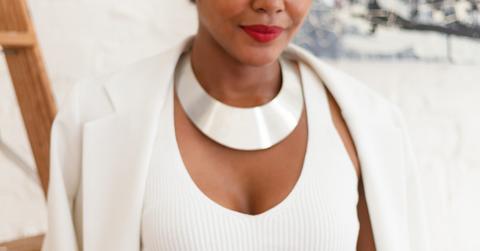Up and coming Interior Designer Danielle Arps could design your future startup office.
Let that be your motivation.
After graduating from Pratt University with a Masters of Science in Interior Design, Arps began working for interior designers who were running their own companies. While freelancing with an interior design agency in NYC she carved out a niche with startups. It didn’t take her long to realize that being an entrepreneur was a tangible goal. “I was always thinking in the back of my mind, how could I eventually work for myself?” Just a couple of months ago she made the leap, and everything changed.
Arps launched Dani Arps LLC in June of this year, and has already racked up high-profile start up clientele including General Assembly, Gilt, Venmo, Code Academy, Contently and Fashionista.
What does she acclaim the rapid momentum of her success to? Simply putting in the work.
Arps sat down with Her Agenda at Memoir’s HQ (one of the many spaces she’s designed) to talk about her journey so far. She explains the inspiration for her work, the grit it takes to be an entrepreneur, and dishes out advice we can all take, no matter what field you’re in.
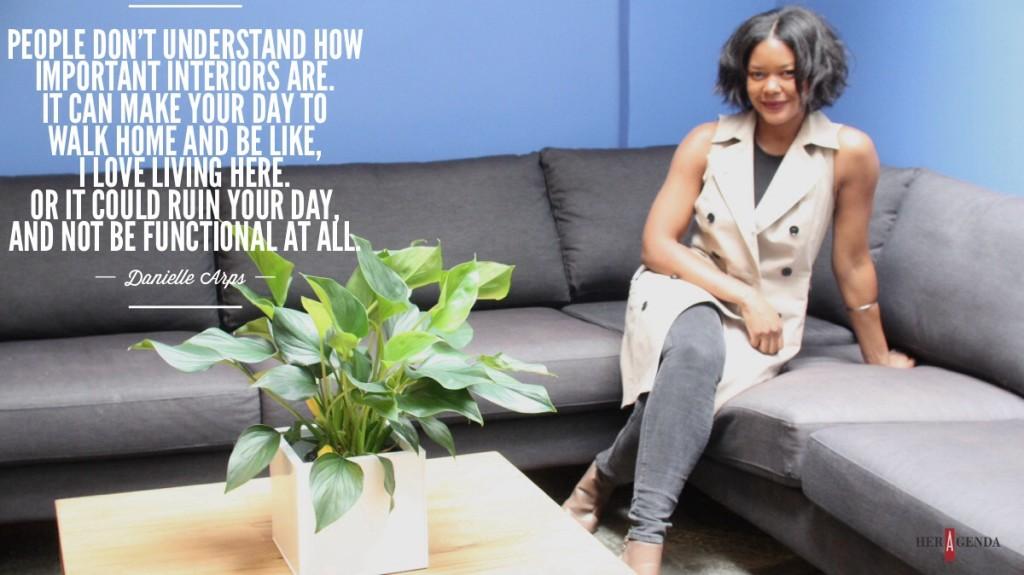
Her Agenda: When did you decide you wanted to be an interior designer?
Danielle Arps: I’m an artist and a musician. I went to school to get a Bachelor of Fine Arts and I minored in Music [at Manhattanville College.]
When I graduated my dad was like, “What are you going to do now?…Why don’t you try interior design?” I was like, “That sounds good! Good idea!” I’ve always had this love of spatiality. I’ve always liked to arrange things, color, scale- I’ve always been about that kind of aesthetic.
I think art and interior design is the same thing. Interior design has art within; it just has to be functional. It should also make you happy. People don’t understand how important interiors are. It can make your day to walk home and be like, “I love living here.” Or it could ruin your day, and not be functional at all.
Her Agenda: How did startups eventually become your niche?
Danielle Arps: I worked through HomePolish. Their focus is mostly on residential. They started to get a few startup clients, and I was taking on most of them. It kind of naturally became my niche.
The thing is, I like residential. However, the startups give you more freedom. They’re a company. They don’t have time to go over each detail. You present them with your aesthetic and what you see for the space. I feel like that’s why I gravitate toward startups. I also just love working with the clients. A lot of them are all like, “Do something cool! We want a sleep room” or, “We want a hidden room.” “We want bean bags.” I’ve been able to do all those things.
Her Agenda: Did you ever imagine you’d be an entrepreneur?
Danielle Arps: Maybe not specifically an entrepreneur, but I never really liked working for other people. I was always thinking in the back of my mind, “How can I eventually work for myself?”
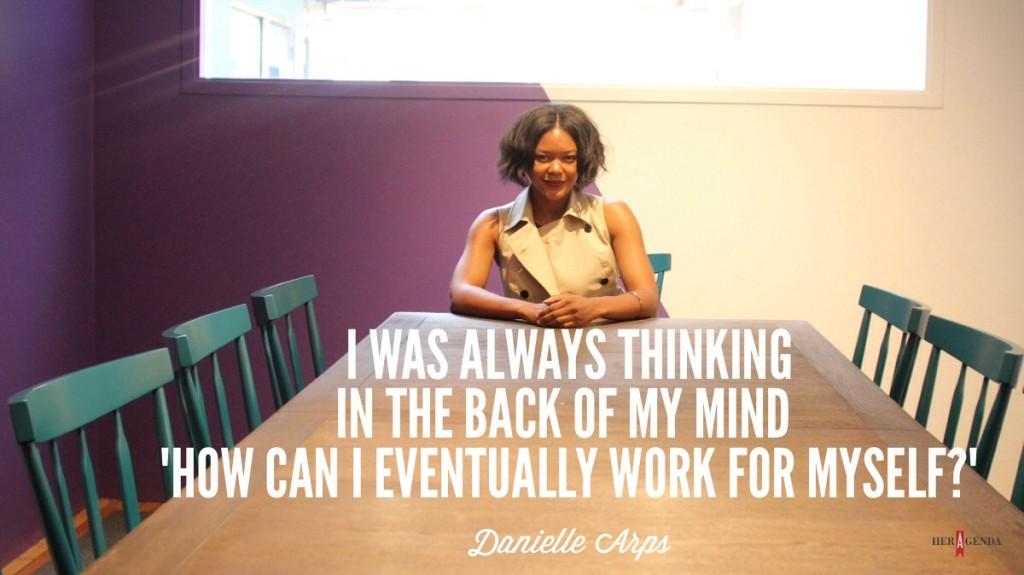
Her Agenda: Where do you get inspiration for the spaces you design?
Danielle Arps: Definitely from the companies themselves. I often get the concept from the idea of the company or their logo. For Kitchen Surfing, their founder is very much into rustic, industrial style with modern lines. I wanted to emphasize what is important about the company, and keep his ascetic in mind. It’s always a combination of what the client likes, what the company is about, and my personal take on that.
You don’t want it to be literal. For example, I find that a lot of companies- and it’s through no fault of their own- will have a green logo so they’ll have green walls. It’s not that comfortable.
You wouldn’t like to be working in these vivid green walls. Maybe you could have lots of greenery!
Her Agenda: Are there any interior designers you look up to?
Danielle Arps: I respect the ones that are a little more quirky and really have their own aesthetic. I like Kelly Wearstler a lot. She is just cool; her style is so glam. It’s completely different from my ascetic that seems to be more industrial, more eclectic. I think architects have a bit more influence just because of Pratt. I found David Adjaye when I was doing my thesis. He is very conceptual. I just think his style is incredible!
Her Agenda: What other clients would you like to work with?
Danielle Arps: I am really into furniture design right now. The Dani Lounge was my first project. I’ve done it in quite a few of my startups. They love it. It’s perfect. I actually first designed it when I was at Pratt for my thesis. That’s when I realized I can actually have a piece of furniture I designed, for real! That is something I’ll love to explore more and will be working on.
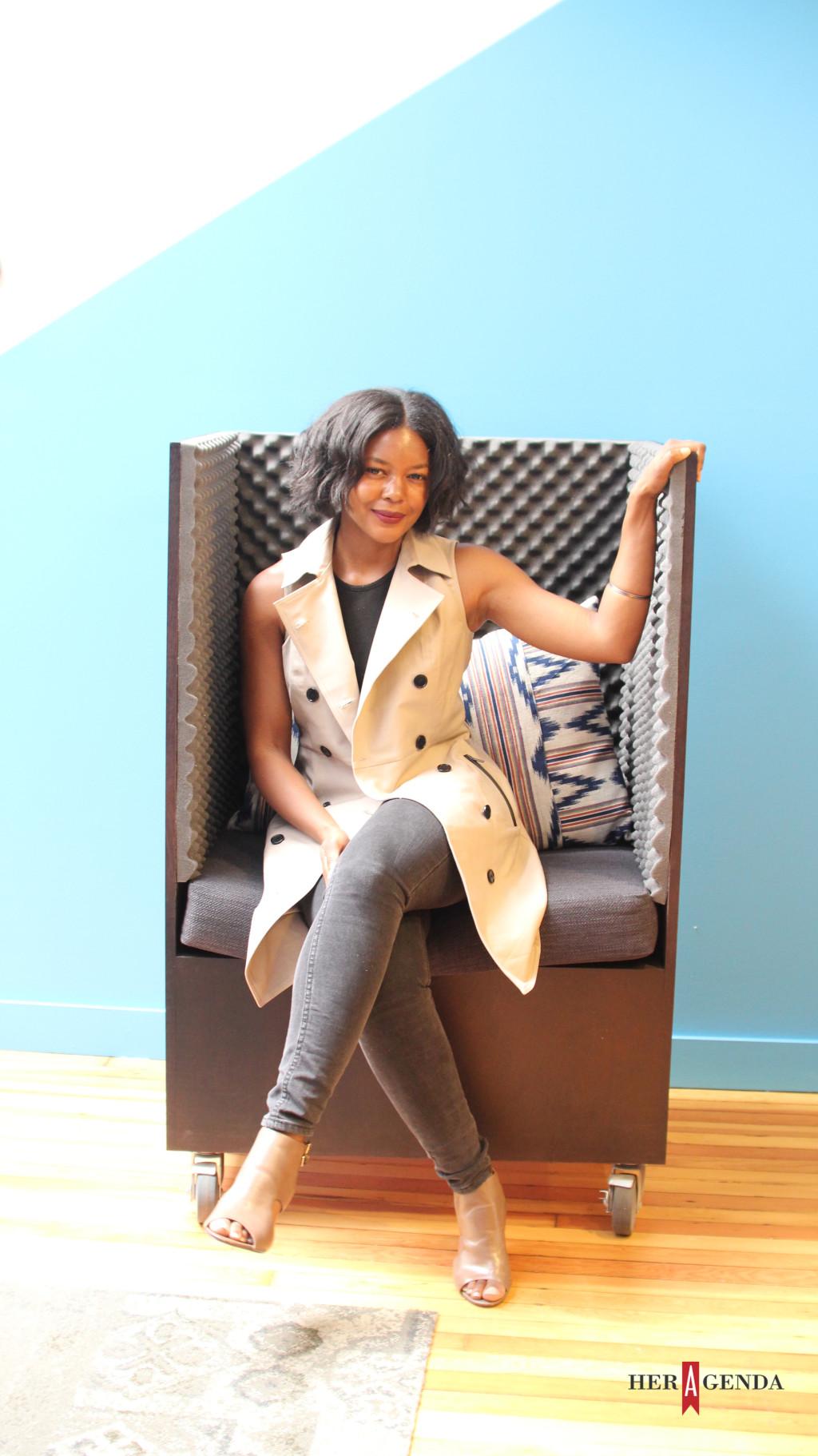
Her Agenda: When was a time you had to take a leap of faith or put yourself out there to accomplish something?
Danielle Arps: When I first left the high end hospitality design firm I was working for a good friend of mine [thought I should have a job first.] She was always there to be supportive, but [I said to myself] I think I just need to quit. I need to go off on my own and figure it out regardless of if I have something or not. I just need to take that step. I’m going to figure it out. I have resources. I’m a smart person.
Her Agenda: How did you feel after that leap of faith?
Danielle Arps: I felt amazing. [I realized] this is something I could do. I could maintain some level of income. I had some saved up, so I wasn’t completely, one hundred percent “How am I going to be paying for my next meal?” But, the job was not as much salary as I was making. I always knew I had to be prepared to work really, really hard. There were many nights when it was almost like I was back in school. I would have to pull all-nighters to get things done. But, it was for me. This is how you have to make a living.
Her Agenda: What advice do you have for young women that want to break into the field of their choice?
Danielle Arps: You have to be an expert in what you’re doing. You have to know what you are doing so you have self-confidence, and people will actually trust you. Depending on what it is, you have to be really, really good at it. Try your hardest to be as good as you can. Then, get out there and meet people. Telling people what you do and being very honest and genuine about it really helps. If people like you, if you are a good person, if you work hard and know what you’re doing— people will support you. So, know what you’re doing. Get your education. Become an expert at it. Then network like a crazy person. I can’t emphasize enough genuine relationships, not the phony stuff. Don’t say, “Hi, I’m so and so. Here’s my card. Call me.” Be a real person and people will respond to that.
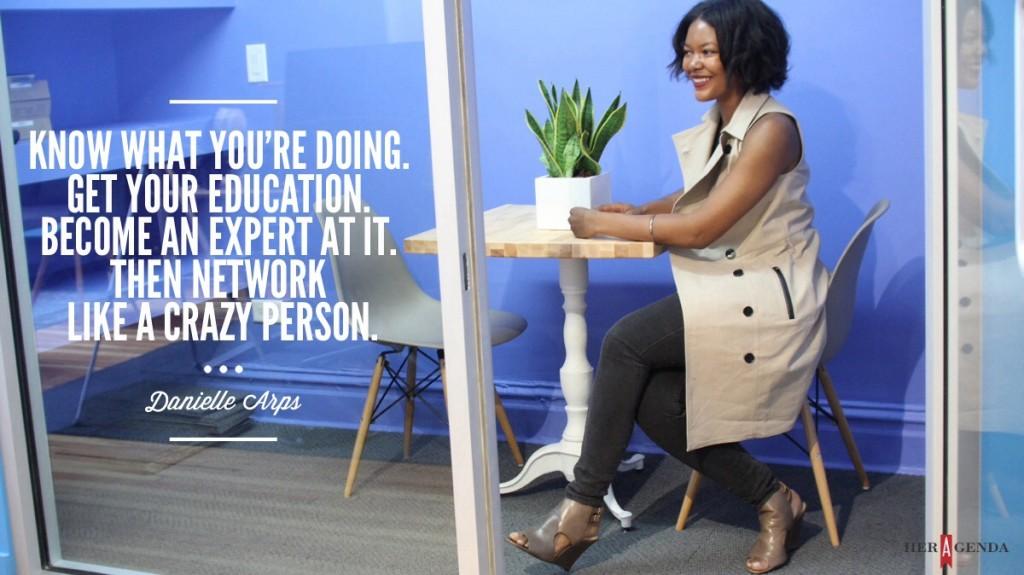
Her Agenda: What do you do for fun? You have all these projects going on, you’re always working!
Danielle Arps: The thing is, I really love my job. Because I’m just at the beginning, I’m perfectly happy working like a crazy person. I do plan on taking a vacation at the end of August to Portugal. I love travel.
I’ve never been there. I was recently in the south of France two months ago. I kind of want to move there. No, not kind of— I definitely want to move there. I travel when I can!
Her Agenda: Where do you want to be in five years?
Danielle Arps: Five years! Still doing what I’m doing. Right now, it’s just me and I have one employee. I’d like to grow. I’m at a shared office space which is very cool, but I’d like to have my own office. Basically, doing what I’m doing right now just bigger. I am actually ecstatic about where I am right now just considering I’ve gotten such great feedback for only having started in June. In June, I got four new clients!
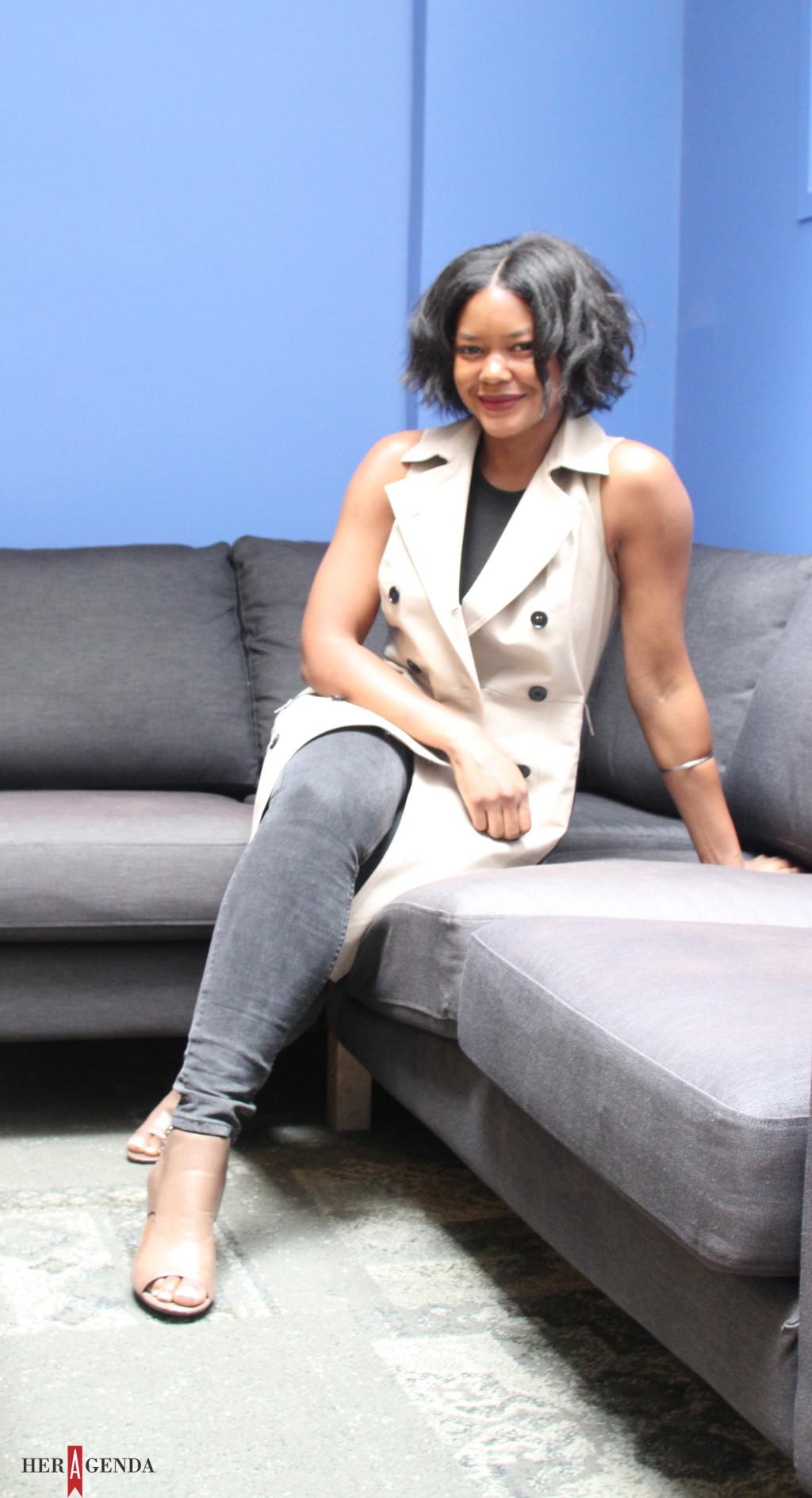
Her Agenda: Do you have a personal motto?
Danielle Arps: It’s kind of absurd, but it’s very direct. It’s essentially: Work hard. Don’t be a dick. I feel like you can get just as much accomplished being direct and honest without being nasty. If you work hard and are kind to people, you will be fine!
NOTE: The above interview was conducted on August 18th, 2014.
UPDATED: On April 16th, Danielle Arps joined us for a live conversation about how to navigate a creative career. Here are her isolated responses to our discussion questions throughout the evening. For more information about the panel, click here.
You can also watch the full video of the conversation.
Her Agenda: The first question I have is, have you ever had a traditional 9-5 job and when did you that life wasn’t for you?
Danielle: Interior design isn’t necessarily 9-5 it’s like 9 until whenever you’re finished with a project. After being there until 4 in the morning one morning, and realizing that this is not what I wanted to do. It wasn’t making me happy, it also was making me sad because interior design is something I love. So the fact that I was there not loving it at 4 in the morning doing something for someone else that I didn’t necessarily believe in, that’s when I realized I have to figure out how I can do this for myself on my own.
Her Agenda: How do you keep the administrative side of what you do from overriding the creativity and the creative side?
Danielle: I’ve been absorbing all of the invoicing and it drives me insane. I went to a work help seminar and they’re like the first thing you should do is an administrative hire. I’m at that point now where I’m juggling five to seven projects and it’s more or less on my own, and (hesitates) I’m hiring people. So it’s establishing a balance and [saying to yourself] okay Friday’s are the only days I’m going to do invoicing. Then regardless of whatever questions bounce off to you saying okay, I’ll get back to you on this day. If I’m focusing always on the administrative, it kind of goes back to the 9-5 it takes the fun out of it.
Her Agenda: Speaking of administrative things, can we take a brief second to talk about how you managed to raise the capital, find the capital, or save the capital to do your own thing?
Danielle: The lucky thing is for interior design you don’t necessarily need anything to start. You just have to have a client. You can work from home. Currently, I’m working from home but I’m finally moving to a new office next week which I’m so happy about. When I quit my job I maybe only had three months of rent saved. I said as long as I could pay my rent, my student loan, and my individual health care for the next few months I would be alright. I started to gain clients, and they were very small. I started to take on as many clients as possible, but still do a very good job so that my name became synonymous with startups and things like that. I just wanted to do it, and do it fast. I’m sort of impatient. One of my very good friends was like umm, what are you doing? And I was like I just have to do it, I just have to try. I feel like for me personally, if I don’t have that kind of pressure built up that like, there’s a timeline or you’re going to be living somewhere where you don’t want to live or not have a house, that pushed me to do the best that I possibly could. I didn’t really have any money saved up but I just hit the ground running and built from there.
Her Agenda: You’ve been a self-employed designer for a year now, what’s the biggest lesson you’ve learned or the most unexpected challenge you’ve had to overcome?
Danielle: Making sure you value your services. I feel like its an issue with women where you say a price and then your client will come back and be like well I don’t want to pay that, and then you’re like ‘okay, well then I can give you discount.’ But really you should just be like okay, you don’t want to pay it so find someone else. It rarely happens that they’re like okay, I’m going to find someone else. They just like suck their teeth [and say] ‘okay, fine.’
Her Agenda: How do you stay productive on a consistent basis? Inspiration and ideas for most people is something that tends to come out of nowhere, and most times it doesn’t show up when we need it the most. So since motivation or inspiration is hard to get a grasp on at times, how do you navigate those moments so that you’re still able to get your job done?
Danielle: That happens. When I’m juggling several projects at once and I don’t want to have the same outcome for each project, [I] kind of get stuck sometimes. I know it’s not the best way to go about it but it’s sort of my process, I just don’t do anything for a week. I don’t even look at it, I don’t think about it and then I can come back with a fresh perspective. For me if I keep working through it and keep doing exercises to inspire myself I get even more stuck.
Her Agenda: Do you have a routine? Even if you don’t have one, what kind of structure do you have to your days to get things done?
Danielle: I don’t have a routine. I literally have no routine. Sometimes I’ll wake up at noon. Sometimes I’ll wake up at 7 in the morning. I know what I have to get done and when it needs to get done so it always gets done. I don’t necessarily say okay I’m going to wake up at 8 and [going to do this this and that.] I tried that for like three days and it was really terrible. As long as you get what you need to get done, there’s no proper way to have your day. I feel like that’s the truth with a lot of creative people, we’re just not wired that way.
Her Agenda: Pursuing a career as a designer, or entrepreneur is not the most stable choice, who or what gave you the confidence to pursue this?
Danielle: This sounds ridiculous but I don’t really care about money. I care about it because I have to, but I don’t care about it. I’m not like I need to make millions of dollars. If it happens, that’s cool. That’s a good way to approach entrepreneurship because probably within the first 6 months to a year you’re probably going to be living off of scraps and I’m okay with that. Yes, I know I’m confident in what I’m doing, and I know I do it well and I’m really passionate about it, but I don’t have that pressure or the need to keep up with the Jones’. It puts me in a position of being able to focus on my passion and the creative part of it.
Her Agenda: Pursuing a career as a designer, or entrepreneur is not the most stable choice, who or what gave you the confidence to pursue this?
Her Agenda: They say the worse enemy to creativity is self-doubt. Richard Petty, a psychology professor at Ohio State University, who has spent decades focused on the subject: “Confidence is the stuff that turns thoughts into action. If the action involves something scary, then what we call courage might also be needed. Or if it’s difficult, a strong will to persist might also be needed. Anger, intelligence, creativity can play a role. But confidence is essential, because it applies in more situations than these other traits do. It is the factor that turns thoughts into judgments about what we are capable of, and that then transforms those judgments into action.” Keeping this in mind, what elements contribute to your confidence? How do you hone in on it/tap into it during periods of self-doubt?
Danielle: I like to kind of wallow in my self doubt sometimes. I’m just like ‘oh I’m so awful I suck.’ But then I’ll just go to my website and I’m like alright, I’m doing alright. I’m not even joking that’s literally what I do sometimes. I’m doing alright.
Her Agenda: Pursuing a career as a designer, or entrepreneur is not the most stable choice, who or what gave you the confidence to pursue this?
Her Agenda: Yes, sometimes I look at my Instagram and I’m like who is this person? That’s not this person sitting here in their pajamas right now.
Danielle: Exactly! The things that you’ve done, when you do them you don’t necessarily think about them while you do them. I’ve been on Refinery29 a bunch of times, I’ve done a commercial randomly, you [just] do it and a month later you’re doing a project and you’re like this is horrible this is so stupid why does anyone hire me? And then you click back and look at what you’ve done and you’re like, yea.
Her Agenda: Pursuing a career as a designer, or entrepreneur is not the most stable choice, who or what gave you the confidence to pursue this?
Her Agenda: What is it like for you as a woman working in an industry that’s very male dominated?
Danielle: Interior design there’s a lot of women there’s a lot of gay men. (Her Agenda: Well at the top it’s pretty male dominated) Honestly I feel like that’s the world we live in. The world is male dominated and so I don’t want to say I like to think like a man, because I think like who I am, and I am a woman and I’m very happy with that, but just in terms of not being sorry for saying what [I] think and not being like you know I’m so sorry that I thought that or I’m so sorry this is my fee. I feel like that’s a constant thing that women say, ‘i’m sorry.’ But I’m not sorry. Not even ‘sorry not sorry,’ just NOT SORRY.
Her Agenda: Pursuing a career as a designer, or entrepreneur is not the most stable choice, who or what gave you the confidence to pursue this?
Audience Member Question: Alright, so this is directed towards all of you basically, I have two passions in my life, I cook and I design. Cooking is what makes me my money and it is very demanding and I also am trying to start a streetwear/clothing/accessory brand and basically I feel like I don’t have enough time to put in the work that I’d like to. I started it two years ago, and if you have any suggestions on how I could focus more on that part. I feel like I am artistically inclined in both, but I would like to basically push that further. I actually just came to the city five days ago to pursue both and try to take it further. This is like my first big step.
Danielle: Just a quick tip, this start up I designed for called KitchenSurfing takes on chefs and they can essentially devise their own schedule and cook for people at home, to build their own portfolio of cooking. Having a job that allows you to have your own schedule is really important if you want to build both brands, so KitchenSurfing, check it out. I think it would make the most sense for you.

